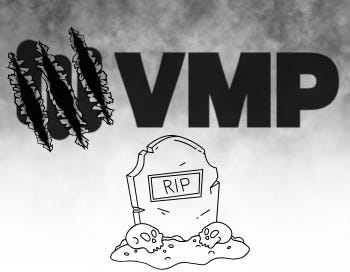Bad With Money. Good With Music. Welcome to the Record Business.
R.I.P., Vinyl Me Please. Suits Fade. Records Endure. Music is Forever.
The Suits, the Songs, and the Scapegoats
With the collapse of Vinyl Me Please, music communities on the Internet are ablaze.
The vinyl subscription service—once a darling of crate-diggers and audiophiles—has entered liquidation. Customers are left without refunds, preorders remain unfulfilled, and thousands feel betrayed by a company they once saw as an ally in a fragile vinyl ecosystem.
And now, as is tradition, the backlash has settled on a familiar target: the suits.
I’ve gotten emails, texts, and private messages from the curious and the distraught. Across social media, Internet communities, and comments sections, one line (or a variation thereof) surfaces repeatedly like an overplayed video on MTV:
“They’re not music people—they’re business people.”
It’s a powerful sentiment. It’s also a comforting one. It gives shape to our frustration, a target to our anger, and assigns blame to a class of people long painted as the villains of the music industry.
But here’s the thing: I’ve worked inside the machine. I’ve also stood outside of it, pissed off and disappointed. The real VMP story is complicated. If we’re going to employ righteous indignation, let’s point our weapons in the proper direction.
The Fall of a Beloved Brand
Vinyl Me Please didn’t implode because people stopped buying records. In fact, vinyl sales were up more than 6% in 2024. VMP’s collapse stemmed from deep internal mismanagement—specifically, a disastrous and allegedly deceptive investment in a vinyl pressing plant.
According to public reporting and legal documents, several top executives at VMP funneled company funds—without full board approval—into building a 14,000-square-foot pressing facility in Denver. The plant never ran effectively. The costs ballooned. The company’s operations buckled. Customer service vanished. Preorders went unshipped. Refunds dried up.
And then came the lawsuits, firings, and finally, liquidation.
This wasn’t just the pressing plant idea. It was the result of poor execution and a remarkable breakdown of internal oversight. And now, labels, fans and artists are left holding the bag. Some labels made licensing deals they’ll never recoup, which may be a rounding error if you’re Universal but sizable burden if you’re an independent. Some fans are sitting with unfilled orders, defective product they can’t return, or subscriptions they’ll never see honored.
So there’s plenty of rage to go around.
When a company ghosts its own customers, when trust is broken, and when artists are left wondering what happened to their stock and royalties, there’s real harm done. And anger is an entirely appropriate response, especially when the only reply to everyone’s questions is deafening silence.
But even then, we should be careful not to flatten every record executive into a cartoon villain.
I’ve Had Dinner With the Suits and Lived to Snark About It
In 2016, I was working at Sony Legacy when I got the kind of invitation that makes your inner 15-year-old hyperventilate: a private dinner with Nick Mason. The Pink Floyd drummer. A personal hero. I’d been working on Floyd catalog releases and on Nick’s Saucerful of Secrets project. This was dream territory.
My colleagues, sensing I’d be able to keep my fanboyish tendencies secured, sat me next to Nick. They trusted in my ability to remember the equation Professionalism > Prog Rock.
I can still smell their naivety.
Nick was exactly whom you’d hope he’d be—gracious, hilarious, endlessly sharp. He was also an incredible storyteller. Whether it was a suitcase misadventure at a 1970s European border crossing or his passion for fast cars, everything came with that wry, distinctly British humor. When I told him I loved Steve Hillage’s Green—a record he produced in the late ’70s—his face lit up. And we were off, deep into prog rock reverie.
Then the chair next to me creaked, and my pulse spiked.
Sony Music CEO Rob Stringer had joined the table.
I’d been in meetings with Rob, but didn’t know him personally. His reputation? Sharp. Serious. All business. I panicked, convinced I was about to get side-eyed for nerding out too hard.
But the boss never interrupts your conversation—he joins it.
Rob asked what we were discussing. Before I could pivot to something safer, Nick deadpanned:
“Albums I produced that nobody remembers.”
Rob raised an eyebrow. “You’re not talking about Steve Hillage, are you?”
I did NOT have that on my bingo card.
What followed was a fifteen-minute rabbit hole of British prog and fusion. Rob name-dropped Brand X, Audience’s House on the Hill, and a few deep prog records that you’d never expect. Nick volleyed with stories of sharing the stage with Soft Machine, Caravan, and The Nice. Rob didn’t have a secret cape-wearing Cyrano de Bergerac feeding him prog rock knowledge through a hidden earpiece at another table. He spoke with the kind of ease that comes from loving the music long before drawing a paycheck from it.
So yeah—Rob Stringer might seem all business and make tough calls. But don’t tell me he doesn’t know music.
Same Goes for Clive Davis
One day, I stepped into the elevator at Sony HQ after lunch. Moments later a man stepped in behind me. He was immaculately dressed, dignified, unmistakable, and carrying himself with the grace of someone who’s been famous longer than you’ve been alive. It was Clive Davis, the legendary label boss who signed Janis. Whitney. Springsteen. And, incidentally, The Dregs and Happy the Man—two personal favorites that failed to make much commercial impact.
One thing I’ve learned in 30+ years in the music industry is when you have a chance to say thank you—even if the person doesn’t know why you’re thanking them—take it. You might not get another chance.
So I told him. I mentioned how much those records meant to me, how Unsung Heroes by The Dregs and Happy the Man’s Crafty Hands still blew my mind.
I expected a polite nod, an awkward silence, and a quick pivot to discussing Alicia Keys. After all, Clive is no spring chicken, and those records were a LONG time ago.
Instead, Clive lit up. He remembered the signings, the sounds, and the era. He wasn’t humoring me. He was genuinely delighted someone still cared about a prog band he signed in 1976—so much so, that we both missed our floor and wound up back in the lobby. And yes, he’s also the guy who dropped them later. Both of those things can be true.
You can read more in the liner notes I wrote for the upcoming reissues of both Happy the Man albums, coming this July via Iconoclassic Records.
The Binary Is Too Easy
Record labels and other music companies aren’t blameless when things go sideways. The Vinyl Me Please story proves that once again. Financial recklessness, poor oversight, broken promises—these aren’t victimless crimes. As Robert Fripp once said:
“When an artist makes a mistake, the artist pays for it. When a record company makes a mistake, the artist pays for it.
The artist has one career. The record company has as many careers as it has artists.”
He’s not wrong. I’ve seen it up close. I’ve been there.
But it’s still worth saying: it’s possible to make bad business decisions and still love the music. You can care deeply and screw up catastrophically. You can know every Brian Eno deep cut and overextend your startup into insolvency.
That doesn’t excuse the mistakes.
But it does mean we might need a better vocabulary for our frustration—one that makes space for disappointment, betrayal, and broken trust without reducing everyone in a suit to a Bond villain.
Even Villains Get the Blues
You can critique the system. You can rage at bad contracts, undelivered vinyl, and executives who vanish when the bills come due. You can call out short-term thinking and demand accountability.
But let’s stop pretending that all music executives care little about music. That trope is tired, lazy, and often just wrong.
The collapse of Vinyl Me Please is a gut punch—for artists, for fans, and for a vinyl ecosystem that was already running on margin and goodwill. It’s also a cautionary tale about what happens when good intentions meet bad execution, and passion gets sidelined by distraction.
At its best, VMP was more than a record club—it was a curatorial voice, a community, and a premium music experience wrapped in tactile joy. Its early model hit many of the subscription world’s best practices: clear value, exclusivity, and an emphasis on storytelling over algorithms.
But as VMP scaled, they simultaneously lost the plot. Shipping delays became the norm, and customer service went silent. Price hikes were paired with shrinking value. Most devastatingly, it allegedly funneled capital and attention into a failed vinyl pressing plant—an ambitious idea fatally derailed by poor communication and worse governance.
And that’s where the story shifts from unfortunate to familiar.
VMP didn’t just break because of market pressures. It broke because it stopped delivering the very thing it promised: reliable access to beautifully packaged records. And unlike successful subscription services—those that grow by doubling down on consistency, customer experience, and operational discipline—VMP fell into a pattern of chasing scope over stability, novelty over trust.
They were a music-first team that made business-second decisions. The tragedy is, that passion was never the problem. The execution was.
So yes—criticize the collapse. Name the harm. Demand better.
But don’t reduce the lesson to “they weren’t music people.”
That’s too easy.
Let’s hold companies accountable without pretending the people inside them don’t care. Because sometimes, they care deeply.
Vinyl Me Please didn’t stop loving records. They just stopped shipping them.







Hey Syd, you and I overlapped a bit at Sony. I was head of Masterworks and Sony Classical U.S. beginning in 2012, retiring in 2017. I can second your opinion of Rob Stringer, a most impressive music man. I enjoyed closing out my career working for him, as well as the legendary Doug Morris. Both guys with a great appreciation and respect for all categories of music, who always had time for me even though I was running the boutique, so to speak. Cheers!
Great insight, as always. I will say that the VMP-initiated pressing plant is actually thriving (https://www.denverpost.com/2025/04/25/paramount-pressing-record-plant-lp-vinyl-gary-salstrom-david-rawlings/)
I think had VMP scaled at a smaller rate, and made what is now Paramount Pressing more vital to their scaling (without the mismanagement, bad deals, et Al.) it would have been their next best move rather than all the new tracks, expanding too quickly when it came to releases, and not having a slower, targeted release strategy. But they aren't the bad guys, just bad business made them the bad guys.